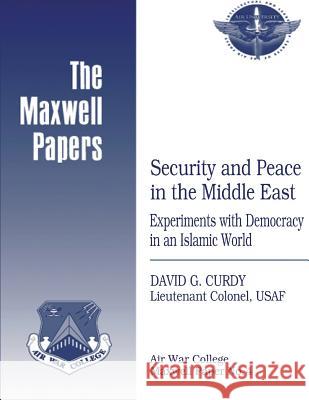Security and Peace in the Middle East: Experiments with Democracy in an Islamic World: Maxwell Paper No. 4 » książka
Security and Peace in the Middle East: Experiments with Democracy in an Islamic World: Maxwell Paper No. 4
ISBN-13: 9781479381524 / Angielski / Miękka / 2012 / 28 str.
Security and Peace in the Middle East: Experiments with Democracy in an Islamic World: Maxwell Paper No. 4
ISBN-13: 9781479381524 / Angielski / Miękka / 2012 / 28 str.
(netto: 53,91 VAT: 5%)
Najniższa cena z 30 dni: 55,84
ok. 16-18 dni roboczych.
Darmowa dostawa!
In this excellent essay Lt Col David G. Curdy examines the prospects for democratic transitions in the Middle East. Henotes that with the conclusion of the cold war, the basis for US Middle East policy, which had centered around oil, Israel, and the Soviet Union, should be reexamined and, perhaps, redesigned. Moreover, major political events stemming from the 1990--91 Gulf War have reenergized efforts to implement democratic processes within the region. Colonel Curdy argues that the West has generally held the view that democracy and Islam are mutually exclusive and incompatible. However, he notes that the Islam-based traditions of consultation, consensus, and independent judgment are being used today to legitimize the rise of democracy in a number of Arab states. In opposition to this democratizing trend is the rise of Islamic radicalism which rejects evolutionary political change and liberal political formulas. The clash of these two approaches will severely test US policy in the Middle East. Contemporaneous with these political currents is a new phase in resolving the decades-old Palestinian-Israeli conflict. The Palestinians' struggle to create a democratic identity will be key in establishing their economic vitality and in reassuring Israelis that a Palestinian state will not be a security threat. Colonel Curdy concludes that the future challenge for the US will be to foster the view among Arab states that the US favors democratization based on Islamic traditions, rather than the imposition of Western democratic institutions on our Muslim friends. When democratic Arab nations can coexist with Israel, the US will have contributed to a basis for regional peace and stability that it has long sought, both as an ideal in itself and as instrumental to America's continuing access to Middle East oil and markets.
Zawartość książki może nie spełniać oczekiwań – reklamacje nie obejmują treści, która mogła nie być redakcyjnie ani merytorycznie opracowana.











